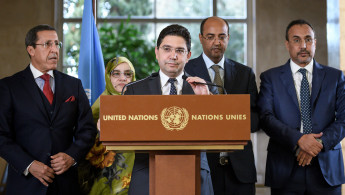An end to the Western Sahara conflict? Talks yield new commitments to 'self-determination'
The talks began after pressure from the Trump administration encouraged officials to double efforts, threatening more serious measures if MINURSO, the UN peacekeeping mission in Western Sahara, did not pursue an end to the decades-old dispute.
MINURSO subsequently rethought its position in light of surprising interest from the US in a conflict which Washington has been roundly ignoring throughout the administrations of several presidents. Those administrations who did pay any attention to it leant heavily towards Morocco, especially during the controversial relationship between Hillary Clinton's foundation and Morocco.
The new American approach forced Morocco to accept sitting to talk face-to-face with the Polisario, in the presence of Algeria and Mauritania as observing neighbours.
Morocco's own change in attitude is balanced by an insistence on "autonomy" (as opposed to independence) as the solution for Western Sahara. However, this insistence has been muted by Moroccan Foreign Minister Nasser Bourita, who said "the right of self-determination, in Morocco's view, is done by negotiation".
Twitter Post
|
That said, Bourita indicated that "the referendum is not on the agenda".
On the other side, the Polisario reaffirmed its "priority to deliver for the self-determination of the Sahrawi people in accordance with relevant UN Security Council and General Assembly resolutions".
What is interesting in these talks, which are to continue in the first quarter of the new year, is that Morocco and the Polisario have agree on "self-determination" as a reference to support their view of a future solution to the Western Sahara dilemma.
This has reportedly driven UN envoy Horst Kohler to advise the parties to refrain from any press statement during the talks to avoid comments that could overshadow the negotiations.
Kohler has also expressed his satisfaction with the roundtable meeting results. "I would like to applaud the delegations for having engaged openly and in a spirit of mutual respect," Kohler said. He added that a "peaceful solution is possible".
The positive atmosphere that has suddenly emerged has been expected as an outcome of US seriousness, which added an extra push and gave the MINURSO a tool to press both parties to adhere to the peace process.
Twitter Post
|
But in spite of this apparent realignment of political interests with Morocco and the Polisario committing to the UN process, the extension of negotiations also serves the UN mission here as it finally proves itself capable of bringing the conflicting foes to the same table.
Kohler is keen to keep expectations carefully managed, with the next set of talks expected in March, just before the UNSC meeting on Western Sahara.
Kohler has brought the parties to a greater commitment to end the conflict than any effort in the past six years. The ice is believed to have been broken, but there is now another challenge: the time that can be dedicated to the process.
Morocco agreeing to negotiate with the Polisario, which calls for an independent state - the Sahrawai Arab Democratic Republic - in the Western Sahara, a territory that Morocco considers part of its country, has not been possible without external pressure from the Trump administration, which has distanced itself from Morocco compared with previous US governments.
Morocco, meanwhile, is handling the situation very carefully, with analysts suggesting the agreement to continue dialogue is a way of drawing out the process to play through Donald Trump's presidential term.
With Trump's insistence that MINURSO's mandate should only be renewed if progress is being made, Kohler has a time limit for success, and maybe a stronger chance of reaching a peaceful solution in Western Sahara.
Habibulah Mohamed Lamin is a journalist formerly based in the Western Sahara refugee camps in Tindouf, Algeria. He has worked as a translator and is director of Equipe Media Branch, a group of media activists covering Western Sahara. His work focuses on the politics and culture of the Maghreb.
Follow him on Twitter: @habibullahWS



